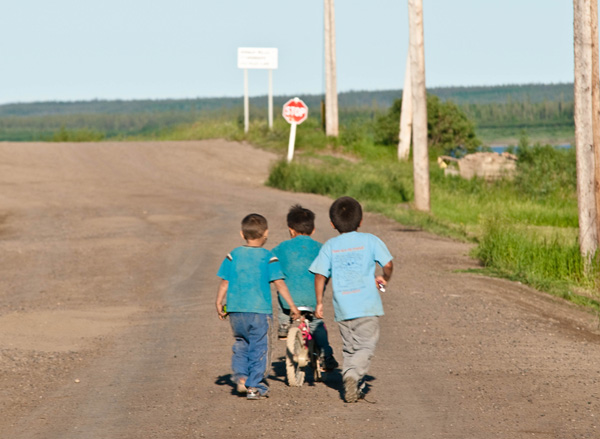Prime Minister Stephen Harper announced the one-day Crown-First Nations Gathering following front-page stories in December about abject poverty in Attawapiskat, Ont., a small Cree community on the shore of James Bay. Joined by other government officials, Harper will meet with a delegation of chiefs led by Assembly of First Nations Chief Shawn Atleo.
The First Nations delegation will be pressing Harper to honour historic treaties while addressing immediate concerns such as education, housing and economic development. Atleo has called it a defining opportunity to “re-set the relationship” and forge a new path of mutual co-operation.
“We began our history as partners,” he has said. “We can move forward as partners.”
Harper has called the meeting a historic opportunity. The meeting comes at the request of First Nations leaders. They want to build on Canada’s November 2010 endorsement of the United Nations Declaration on the Rights of Indigenous Peoples.
For Weisgerber, the gathering is “highly symbolic and important” because of the Crown’s fiduciary responsibility to protect treaty rights. His diocese has Canada’s largest per capita number of aboriginal people.
The archbishop called for a “more profound understanding” of the situation based on history and facts. He said the federal government cannot solve the problems facing aboriginal peoples by itself and that relationship building and understanding needs to take place on the provincial and local levels as well.
“Where the rubber hits the road is in the individual communities, especially in Western Canada,” he said. “There’s a huge amount of misunderstanding and distrust between the two communities.”
Cecil Chabot has consulted with the federal government, First Nations’ and Church leaders on aboriginal issues. He sees the meeting as an opportunity to rebuild the relationship based on the intent brought to original treaties by many First Nations’ people.
“They sought to enter into a new relationship that would provide for a sharing of resources and mutual assistance,” Chabot said. “From relationships flow mutual responsibilities.”
As an example of mutual responsibility, Chabot points to how “the Cree responded so courageously when ‘the Crown’ came under attack in the First and Second World Wars.”
Today, however, Chabot says that many people regard “treaty rights” as “special rights” and many Canadians object to the notion of special rights, or they demand aboriginal people prove they are “special.” He says that can lead to “fossilization of culture,” or the use of culture as “an identity tag.”
Chabot says that if you boil down aboriginal rights what you get are rights based on treaties that set out allocations of specific lands and resources. He compares those rights to an average Canadian homeowner whose property rights are protected in law. By that token, Chabot says aboriginal peoples are not seeking special rights, but the same rights other Canadians take for granted.

The First Nations delegation want immediate concerns like education, housing and economic development addressed.
Photo by Michael Swan
Despite treaties, Canadian law offers little to prevent newcomers from coming in and establishing themselves on native land, Chabot said.
“Aboriginal people have rights recognized in the Constitution, but by and large not defined in a way they can be protected.”
Chabot said that much from Catholic social teaching can be brought to bear in defining aboriginal rights in ways that do not isolate or ghettoize people.
“Above all, non-aboriginal and aboriginal Canadians have to stop seeing each other in terms of what is owed or demanded,” he said. “We have to see the good in each other and strive to help it flourish.”
For Weisgerber, the first obstacle is defining the issue.
“I don’t think people see the challenge in the same way,” he said. “There is no consensus on what the challenge even is. We have a considerable amount of reflection and work to do.”
Fairly or unfairly, the Conservative Party’s Reform Party roots have made it seem unsympathetic to aboriginal issues, Chabot said. But many people believe the party has “matured.” Some aboriginal leaders are cautiously optimistic about working with the Tories, he said, noting that some First Nations leaders have indicated that Conservatives may not promise much, but they usually deliver what they promise.
Behind the scenes, Chabot said that some Conservative and First Nations leaders recognize they “actually have a lot in common.” Small-c conservatives, aboriginal peoples and the Catholic Church support the principle of subsidiarity, which applied to native peoples means some form of self-government.
“If you applied conservative principles well, to an accurate reading of the situation, the outcomes could be quite beneficial to native people,” Chabot said. “A conservative approach recognizes the importance of civic society and multiple social layers that are based on human beings’ organic relationships to each other,” he said. “This is very similar to the way aboriginal peoples’ see their societies.”
Under Pierre Trudeau, the emphasis was on the individual and the collective (the state), though subsequent Liberal leaders, especially Paul Martin with his Kelowna Accord, veered away from that approach in a positive direction, Chabot said. Under Trudeau it was individuals and the state, with a stress on each individual being equal and having the same rights.
“This did not leave much room for the organic nature of society and the limits of what governments can do,” Chabot said.


